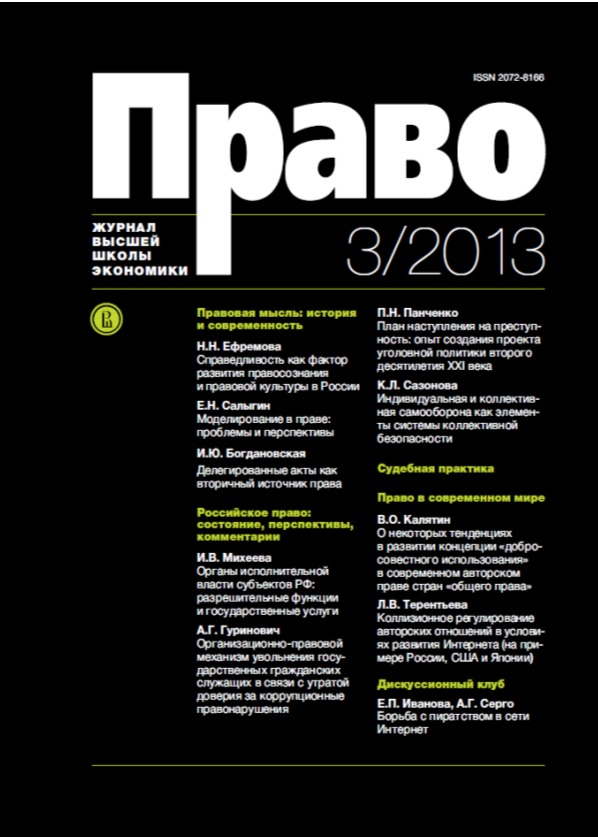Практика применения законодательства о рекламе
Аннотация
Данная статья содержит попытку анализа правового регулирования современного рекламного бизнеса на примере России. Предметом изучения стали те компоненты рекламной деятельности, которые остались не урегулированными, по мнению автора, должным образом нормами федерального закона Российской Федерации «О рекламе», действующего с 2006 г. В качестве источников в публикации использованы: Европейская конвенция о трансграничном вещании, упомянутый ранее федеральный закон, Кодекс Российской Федерации об административных правонарушениях, решения арбитражных судов, нормативные акты исполнительных и судебных органов, пресс-релизы частных фирм, учебные пособия. Отмечается, что упущением действующего законодательства приходится считать исчезновение ранее закрепленного запрета прерывать рекламными роликами демонстрацию художественных фильмов по телеканалам чаще чем раз в 15 минут. В настоящее время закон регулирует продолжительность рекламных пауз, но не их частоту. Нарушающим права потребителей стало появление рекламы при переключении каналов на платном телевидении. Подчеркивается нецелесообразность снятия законом ограничений на рекламу в телеканалах, доступ к которым осуществляется с применением декодирующих технических устройств. Статья обращает внимание на несовершенство конструкции ряда статей закона о рекламе, из-за чего, в частности, некоторые фирмы-производители алкогольных напитков безнаказанно рекламируют сразу по многим телеканалам свою продукцию в рамках так называемых зонтичных брендов. Законодатель так и не дал четких и обоснованных критериев при регулировании актуального вопроса - что следует считать информацией рекламного характера и как измерять объемы рекламы в средствах массовой информации. Автор напоминает, что из-за пробелов в законе разграничение рекламной информации и редакционного материала оказалось полностью в сфере ответственности контрольно-надзорных и судебных органов, что может составлять коррупционный компонент деятельности таких органов. Кинопродукция и телепередачи все чаще анонсируют новые товары. В связи с этим назрела переработка закона 2006 г.
Литература
Administrativniy reglament prodostavleniya Federal'noy sluzhboy po nadzoru v sfere svyazi, informatsionnykh tekhnologii i massovykh kommunikatsii gosudarstvennoy uslugi po registratsii sredstv massovoy informatsii Minkomsvyazi Rossii, utverzhdenniy prikazom Minkomsvyazi Rossii ot 29.12.2011 g. [Administrative Rules of Providing by the Federal Service on Control in the Area of Connection, Information Technologies and Mass Communications of Government Service on Registering Mass Media by the Russian Communication Ministry as Established by the Order of the Russian Communication Ministry as of 29/12/2011, no 362]. Available at: http://www.rsoc.ru/mass-communications/smi-registation/ (accessed 12.08.2013)
European Convention on Transfrontier Television. Available at: http://conventions.coe.int/treaty/rus/Treaties/Html/132.htm (accessed 12.08.2013)
Informatsionnoe pis'mo Prezidiuma Vischego Arbitrazhnogo Suda Rossiskoy Federatsii ot 25 dekabrya 1998 goda no37 “Obzor praktiki rassmotreniya sporov, svyazannykh s primeneniem zakondatel'stva v reklame” [Information Letter of the Presidiim of the RF Supreme Arbitration Court of December 25th 1998, no 37 “Review of Practice of Considering Cases Connected with the Application of Legislation in Advertising”]. Available at: http://www.arbitr.ru/as/pract/vas_info_letter/3015.html (accessed 12.05.2013)
Angelopoulos Ch. (2010) Product Placement in European Audiovisual Productions. European Audiovisual Observatory. Iris Plus. Available at: http://www.obs.coe.int/oea_publ/iris/iris_plus/index.html (accessed 12.05.2013)
Sviridova E. (2009) Pravovoe regulirovanie reklamy: Ucheb. posobie dlya studentov vuzov, obuchayusschikhsya po spetsial'nosti “Yurisprudentsiya” [Legal Regulation of Advertising: A Textbook for the Students Specializing in Jurisprudence]. Moscow, Unity-Dana; Zakon I Pravo, pp. 165-167.
Copyright (c) 2013 Право. Журнал Высшей школы экономики

Это произведение доступно по лицензии Creative Commons «Attribution-ShareAlike» («Атрибуция — На тех же условиях») 4.0 Всемирная.


















